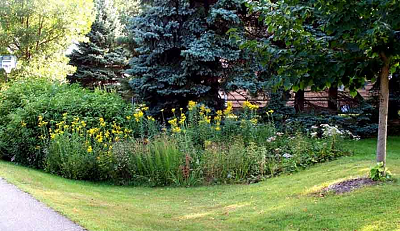
Rain Gardens

A rain garden is a garden located in a low-lying area designed to slow the flow of runoff rainwater and allow filtration into the soil. Redirecting and retaining stormwater with rain gardens reduces the flow of runoff into storm drains and protects streams and rivers from damaging stormflows and pollutants.
During rain events fertilizers, pesticides, debris and other pollutants wash across lawns and driveways, down streets, and into the nearest storm drain, eventually flowing into a waterbody. In urban environments, most water pollution comes from stormwater runoff. Urban runoff also absorbs heat from sidewalks, roads, and roofs which can elevate stream temperatures. Rain gardens filter this runoff through soil and plants, thereby reducing pollution.
Click the following links for ideas on how to create your very own attractive and beneficial rain garden, or contact your local water authority to see if a rain garden workshop is offered in your area.
-
Related Links
Rain Gardens- A How-To Manual for Homeowners - Wisconsin Department of Natural Resources
This manual provides homeowners and landscape professionals with the information needed to design and build rain gardens on residential lots.
Gardening for Wildlife: Corralling the Rain - National Wildlife Federation
This magazine article provides you with background information on green infrastructure, rain garden form and function, and rain garden tips.
Reclaim Your Rain: Rain Gardens for Home Landscapes - Clean Water Atlanta
An educational page with information on how rain gardens function, how to choose the best location to create a rain garden, a list of plants, and steps on how to create your own rain garden.
Rain Gardens: Gardening with Water Quality in Mind - Friends of Bassett Creek
Refer to this page for background information on rain gardens, different types of gardens, list of plants for rain gardens, and information on polluted runoff.